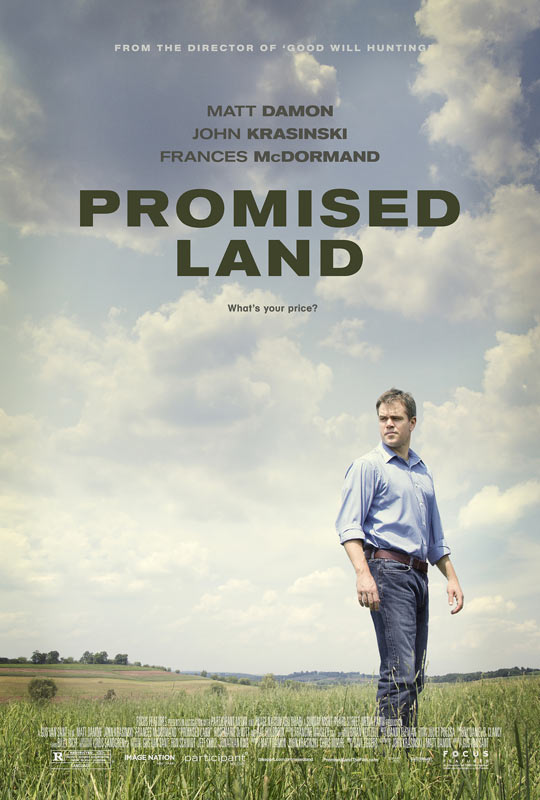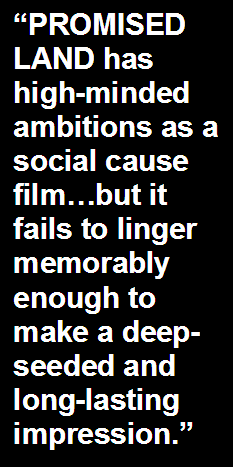A film review by Craig J. Koban February 6, 2013
PROMISED LAND ![]() ½
½
Steve: Matt Damon / Frank: Hal Holbrook / Dustin: John Krasinski / Sue: Frances McDormand / Alice: Rosemarie DeWitt
Directed by Gus Van Sant / Written by Matt Damon and John Krasinski, based on a story by Dave Eggers.
 PROMISED
LAND represents the re-teaming of star/co-writer Matt Damon with director
Gus Van Sant after two previous collaborations (2003’s GERRY and
1997’s GOOD WILL HUNTING) and it is a work with the most noble-minded
aspirations. The main problem
with the film, though, is that despite its earnest and heartfelt message
we are left with a somewhat dramatically contrived effort that won't
seriously sway many filmgoers towards it cause.
Not only that, but the core of PROMISED LAND (big money-loving
corporations = bad / small town Americans being ravaged by them
while fighting for their livelihoods = good) has been told countless
times before and to much better effect.
PROMISED
LAND represents the re-teaming of star/co-writer Matt Damon with director
Gus Van Sant after two previous collaborations (2003’s GERRY and
1997’s GOOD WILL HUNTING) and it is a work with the most noble-minded
aspirations. The main problem
with the film, though, is that despite its earnest and heartfelt message
we are left with a somewhat dramatically contrived effort that won't
seriously sway many filmgoers towards it cause.
Not only that, but the core of PROMISED LAND (big money-loving
corporations = bad / small town Americans being ravaged by them
while fighting for their livelihoods = good) has been told countless
times before and to much better effect.
Based
on a story by Dave Eggers and written by both Damon and his co-star John
Krasinski, PROMISED LAND dives head-first into the controversial world of
hydraulically extracting fossil fuels – natural gas in particular –
from deep below the earth’s surface, colloquially known as “fracking.”
Specifically, fracking harvests natural gas by crushing
subterranean rock layers with massive amounts of pressurized water –
which seems okay – and equally large amounts of harmful chemicals
– which seems not-so-okay. The
process itself has come under much scrutiny over the last few years,
seeing as the procedure seems to inevitably taint local water supplies,
not to mention that all of the chemicals used can be harmful to life in
general near its epicenter.
PROMISED
LAND introduces us quickly to a staunch pro-fracking corporate man named
Steve Butler (Damon), who represents Global Crosspower Solutions, a
company worth billions that essentially makes their money by going into
small and impoverished rural towns and buys up the land from its residents
with veiled promises of sharing their wealth, all in an effort to mine
their lands for all of the natural gas they can get their hands on.
Steve works with another sales-pitching shark named Sue (a spot-on
Frances McDormand), and they both come to one economically devastated
Pennsylvanian farming community to convince them to do “the right
thing” and sell their land to them so they can milk it for everything
its worth.
|
|
Steve
and Sue, compellingly enough, are not black and white corporate villains
oozing contempt for their prey. Steve
was once himself an Iowan farm boy whose own town collapsed because the
local tractor company pulled out. Sue
is a fairly congenial and well-meaning single mom that loves her son and
tries to stay connected with him as much as possible while on the road.
Yet, despite their rather humble backgrounds and congenial nature,
Steve and Sue and cunning when it comes to the art of selling their cause,
even going as far as to dull themselves up with dirty khakis, work boots
and flannel shirts; they even drive an old semi-reliable pick-up truck to
effectively blend in. That’s
the whole deceptively simple aspect of their plan: make the locals think
that they are just one of them to enable their trust to the point of
signing those leases.
The town seems initially very receptive to Global’s offers, but when they are about to put it to a vote, a former MIT engineer turned part-time science teacher (the wonderful Hal Holbrook) decides to stand up and be the voice of reason, pleading with the people to reconsider the obvious damaging side-effects of fracking. To make matters more complicated for Steve and Sue, their once golden and signed, sealed, and delivered sales pitch is halted even further by the appearance of Dustin Noble (Krasinski), a devoted environmentalist that has descended on the town to curb its residents to vote no. He has a dark history with fracking – his family’s dairy farm was apparently ravaged by Global’s natural gas extraction measures – and now he wants to ensure that it never happens again to another town.
Part
of the pleasure of PROMISED LAND comes with how level headed it is with
the games of one-upmanship between Dustin and Steve as both yearn to win
over popular approval while going to any means necessary to do so.
Van Sant has a disquieting manner of relaying how fracking has such
a large impact on both people in power and those with nothing to lose when
faced with financial ruin. One
of the intriguing sub-themes here is how the local community is so
financially stressed during these economically hellish times, so much so
that they are willing to sign over their names – and potentially their
town’s legacy and well being – to a corporation whose methods
they don’t fully understand. I
liked how the townsfolk are not presented as one-note, stereotypical
slack-jawed simpletons; they are, for the most part, not dumb people, but
smart, literate, and desperate people that are looking for salvation.
The
performances help sell all of this, with Damon’s perhaps being the most
tricky as he has to relay the sneaky hustler that is Steve while
simultaneously showing him as a fairly sincere and forthright man that
believes in his cause. Steve
is not a mustache-swirling villain, but rather a decent man from humble
beginnings that has drank too much of his company’s own Kool-Aid in
towing their ideology for too long. Moreover,
he actually believes that he’s helping the people even when he’s
deceiving them, which makes for a chilling dynamic.
He gives an unsettlingly memorable monologue in the film as to how
he believes the town is stupid for not taking the money and running,
seeing as it would net them enough capital to flip the bird at any
problem.
McDormand
is equally refined in her low-key performance; she just has a way of
eliciting a penetrating stare that evokes more meaning than just about any
line of long-winded dialogue could muster.
Krasinski exudes sweet-tempered charm and calm even when faced with
the coordinated efforts of a billion dollar corporation that legally bats
a .1000 every time. Rosemary DeWitt is fine – albeit in a painfully
underwritten role – as a local schoolteacher that emotionally reaches
out to both Steve and Dustin. And
the great Hal Holbrook has a deceptive manner of flying in under the radar
and hijacking just about every scene he’s in with his soft-spoken and saintly gumption.
For as much as I appreciated the actors' work here, the film’s set-up and the issues it tackles (let’s face it: fracking is not really that sexy of a film premise), PROMISED LAND implodes and unravels by the weight of its own inherent predictability. The final sections of the story and its resolution rings with perhaps a bit too much obviousness and feels mightily telegraphed, not to mention that there’s a late-game-breaking plot-twist that seems like the product of a previous ham-infested and eye-rolling script re-write. In the end, anti-corporate swindler films are almost as old as the medium itself, so it takes a special kind of film to overcome our overt familiarity with the genre. PROMISED LAND has high-minded ambitions as a social cause film that wants to pump its defiant fist in the air at big business skull-duggery, but it fails to linger memorably enough to make a deep-seeded and long-lasting impression.

